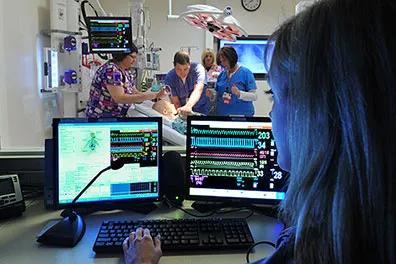The Simulation Program

The Simulation Program at Children’s Health℠ is committed to communication, collaboration and improving outcomes in a crisis situation – which is the time when all these qualities mean the most. Our goal is to help health care providers develop the skills and teamwork behaviors they need for any situation, and we know that these skills are best learned under realistic conditions.
Mission:
Making life better for children through the use of healthcare simulation and educational technologies to improve quality and patient safety outcomes by promoting a culture of learning for our team members and community partners.
Vision:
Perform as a center of excellence for pediatric simulation by offering innovative, high-quality, multimodal simulation strategies and education to provide an immersive interprofessional learning experience based on our core values of Selfless Service, Passionate Advocacy, Commitment to Excellence, and Unwavering Integrity.